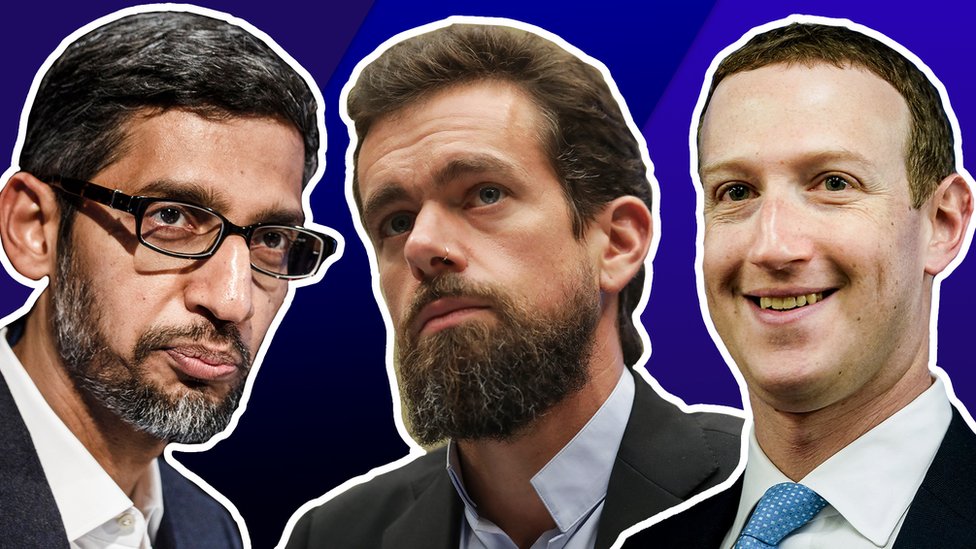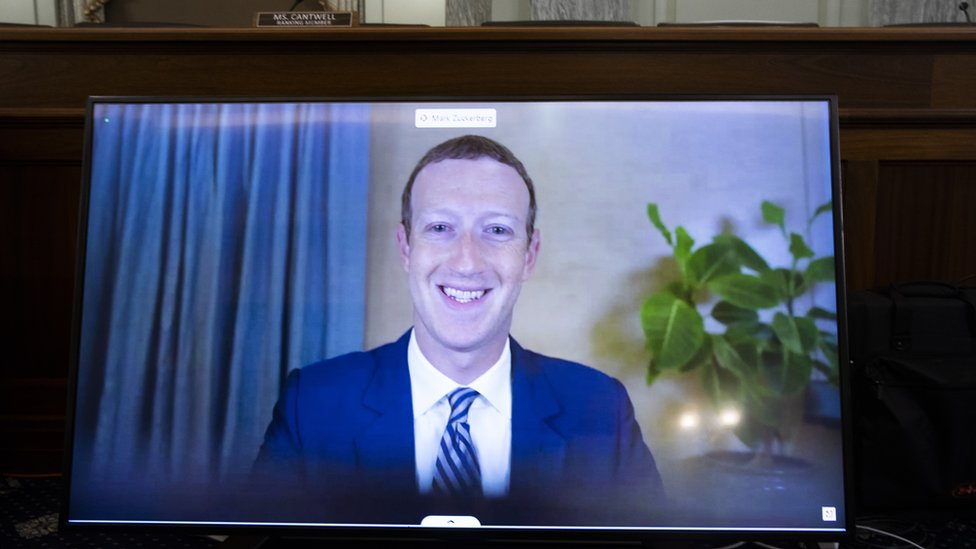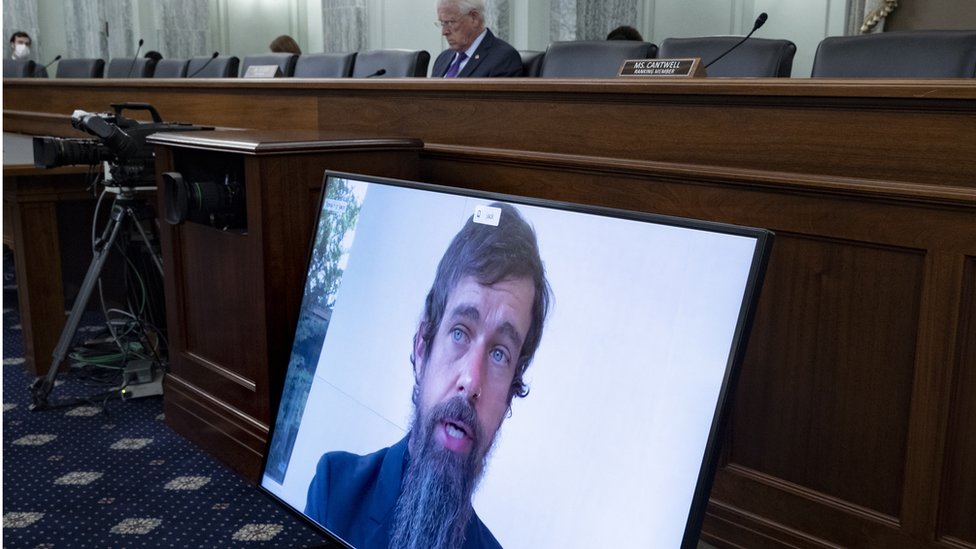Facebook, Twitter and Google face questions from US senators
-
- Published

At present, the companies cannot be sued over what their users post online, or the decisions they make over what to leave up and take down.
Some politicians have raised concerns this "sweeping immunity" encourages bad behaviour.
But the chief executives say they need the law to be able to moderate content.
Facebook's Mark Zuckerberg, Twitter's Jack Dorsey and Google's Sundar Pichai were summoned before the Senate after both Democrats and Republicans agreed to call them in for questioning.
'A loophole'
Senators are worried about both censorship and the spread of misinformation.
And some industry watchers agree the legislation - known as Section 230 - needs to be revisited.
"[It] allows digital businesses to let users post things but then not be responsible for the consequences, even when they're amplifying or dampening that speech," Prof Fiona Scott Morton, of Yale University,
told the BBC's Tech Tent podcast."That's very much a publishing kind of function - and newspapers have very different responsibilities.
"So we have a bit of a loophole that I think is not working well for our society."

As the hearing began, Mr Zuckerberg vanished, unable to connect to the committee meeting - something Republican senator Roger Wicker called a "most interesting development".
But after a brief recess, Mr Zuckerberg told politicians he supported changes to the rule "to make sure it's working".

What is Section 230?
Section 230 is the main legal protection preventing social networks being sued.
It means websites themselves are not generally responsible for illegal or offensive things users post on them.
They are treated as neutral middlemen - like newspaper sellers rather than the editors that decide what goes in the paper.
Originally seen as a way to protect internet providers such as BT or Comcast, it has become the main shield for huge sites such as Facebook, Twitter and YouTube, which cannot possibly review every post from their users before publication.
But politicians say Section 230 is outdated.
Democrats take issue with the spread of lies online without consequences for the sites.
Republicans say big tech is using its moderation powers to censor people it does not agree with - making editorial calls rather than staying neutral.
And both sides agree they want to see the social networks held accountable.

Mr Dorsey told the committee Section 230 "is the most important law protecting internet speech" and its abolition "will remove speech from the internet".
But he found himself faced with pointed questions over the implementation of Twitter's policies about what it removed or labelled misinformation.

Asked why Twitter would label a post from US President Donald Trump about the security of mail-in ballots but leave posts by Iran's Ayatollah Ali Khamenei that threatened violence against Israel unlabelled, Mr Dorsey replied the Iranian leader's tweets were considered "sabre rattling", which did not violate its terms of service.
Mr Dorsey also found himself facing questions from Republican senators over Twitter's limiting of a New York Post article about Joe Biden's son.
"The New York Post isn't just some random guy tweeting," Republican Ted Cruz said.
"Who the hell elected you and who put you in charge of what the media are allowed to report and what the American people are allowed to hear?"
Mr Zuckerberg, meanwhile, revealed a "private meeting" with the FBI had warned firms to be wary of leaked material.
He said that Facebook, and he "assumed" the other companies, had been warned about a possible "hack and leak operation in the days or weeks leading up to this election".
The FBI "suggested that we be on high alert and sensitivity, that if a trove of documents appeared that we should view that with suspicion that it might be part of a foreign manipulation attempt," he said.
On Section 230, Mr Zuckerberg told the committee Section 230 encouraged free expression and "helped create the internet as we know it".
But he added: "The internet has also evolved.
"And I think that Congress should update the law, to make sure that it's working as intended."
Mr Pichai, though, fiercely defended the law.
"Our ability to provide access to a wide range of information is only possible because of existing legal frameworks like section 230," he said.
"The United States adopted Section 230 early in the internet's history.
"And it has been foundational to our leadership in the tech sector."
'Political ploy'
Both President Trump and his election rival Joe Biden have called for the removal of Section 230, though for different reasons.
But some Democrats used their time to criticise the entire hearing, positioned so close to the election, as a political ploy.
"I've been an advocate of reform of Section 230 for literally 15 years," senator Richard Blumenthal told the committee, referring to his time as a state attorney general.
"But frankly I am appalled that my Republican colleagues are holding this hearing literally days before an election, when they seem to want to bully and browbeat the platforms here to try and tilt them towards President Trump's behaviour.
"The timing seems inexplicable."
His colleague Brian Schatz, refusing to ask any questions of the three chief executives, "because this is nonsense", said: "What is happening here is a scar on this committee and the United States Senate.
"We have to call this hearing what it is.
"It's a sham."
"from" - Google News
October 29, 2020 at 12:59AM
https://ift.tt/35IsC8P
Facebook, Twitter and Google face questions from US senators - BBC News
"from" - Google News
https://ift.tt/2SO3d93
Shoes Man Tutorial
Pos News Update
Meme Update
Korean Entertainment News
Japan News Update

No comments:
Post a Comment